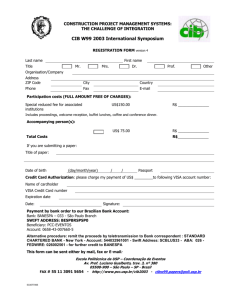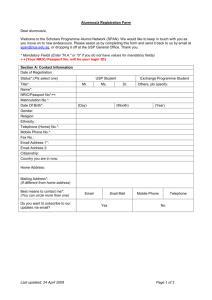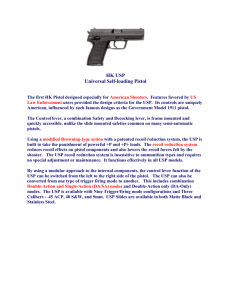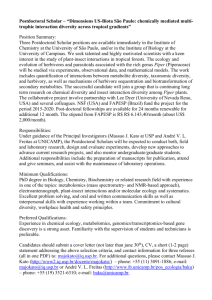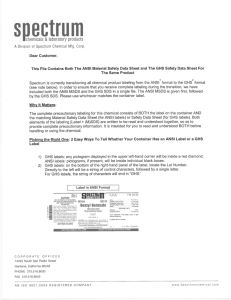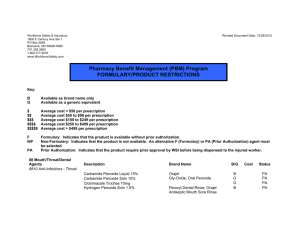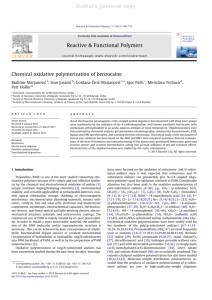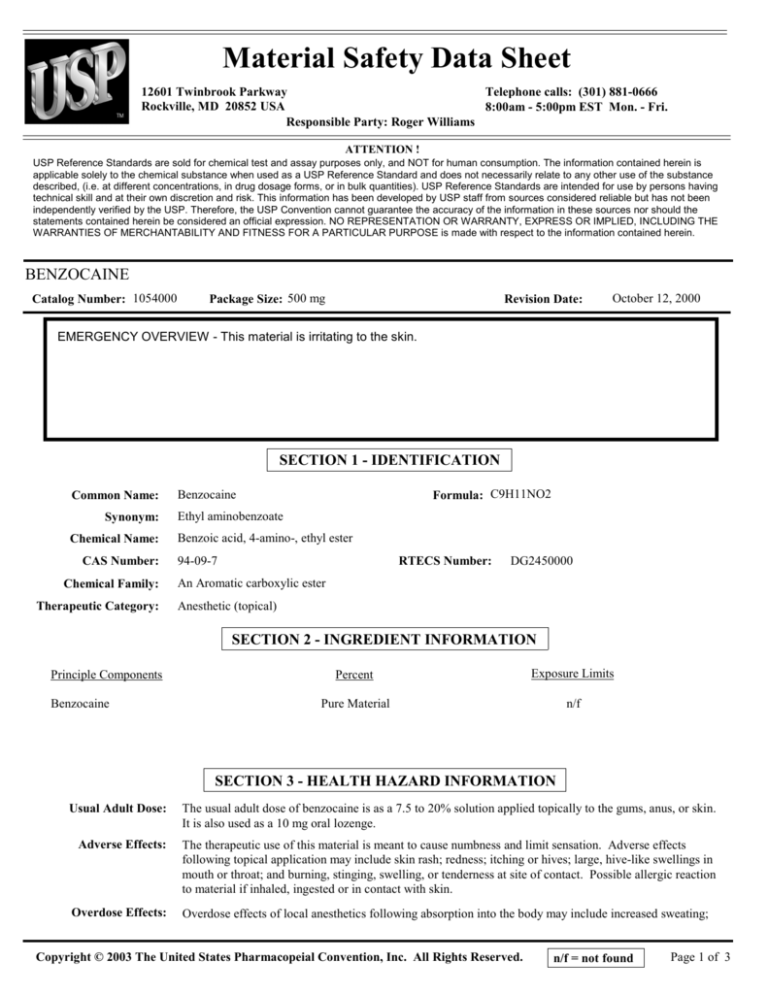
Material Safety Data Sheet
12601 Twinbrook Parkway
Telephone calls: (301) 881-0666
Rockville, MD 20852 USA
8:00am - 5:00pm EST Mon. - Fri.
Responsible Party: Roger Williams
ATTENTION !
USP Reference Standards are sold for chemical test and assay purposes only, and NOT for human consumption. The information contained herein is
applicable solely to the chemical substance when used as a USP Reference Standard and does not necessarily relate to any other use of the substance
described, (i.e. at different concentrations, in drug dosage forms, or in bulk quantities). USP Reference Standards are intended for use by persons having
technical skill and at their own discretion and risk. This information has been developed by USP staff from sources considered reliable but has not been
independently verified by the USP. Therefore, the USP Convention cannot guarantee the accuracy of the information in these sources nor should the
statements contained herein be considered an official expression. NO REPRESENTATION OR WARRANTY, EXPRESS OR IMPLIED, INCLUDING THE
WARRANTIES OF MERCHANTABILITY AND FITNESS FOR A PARTICULAR PURPOSE is made with respect to the information contained herein.
BENZOCAINE
Catalog Number: 1054000
Package Size: 500 mg
Revision Date:
October 12, 2000
EMERGENCY OVERVIEW - This material is irritating to the skin.
SECTION 1 - IDENTIFICATION
Common Name:
Synonym:
Chemical Name:
CAS Number:
Chemical Family:
Therapeutic Category:
Formula: C9H11NO2
Benzocaine
Ethyl aminobenzoate
Benzoic acid, 4-amino-, ethyl ester
94-09-7
RTECS Number:
DG2450000
An Aromatic carboxylic ester
Anesthetic (topical)
SECTION 2 - INGREDIENT INFORMATION
Principle Components
Benzocaine
Percent
Exposure Limits
Pure Material
n/f
SECTION 3 - HEALTH HAZARD INFORMATION
Usual Adult Dose:
The usual adult dose of benzocaine is as a 7.5 to 20% solution applied topically to the gums, anus, or skin.
It is also used as a 10 mg oral lozenge.
Adverse Effects:
The therapeutic use of this material is meant to cause numbness and limit sensation. Adverse effects
following topical application may include skin rash; redness; itching or hives; large, hive-like swellings in
mouth or throat; and burning, stinging, swelling, or tenderness at site of contact. Possible allergic reaction
to material if inhaled, ingested or in contact with skin.
Overdose Effects:
Overdose effects of local anesthetics following absorption into the body may include increased sweating;
Copyright © 2003 The United States Pharmacopeial Convention, Inc. All Rights Reserved.
n/f = not found
Page 1 of 3
BENZOCAINE
Catalog Number: 1054000
Package Size: 500 mg
Revision Date:
October 12, 2000
low blood pressure; pale skin; slow or irregular heartbeat which may lead to cardiac arrest; blurred vision;
confusion; convulsions; dizziness or lightheadedness; drowsiness; feeling hot, cold, or numb; ringing in
ears; shivering; anxiety; difficulty in breathing on exertion; headache; and tiredness or weakness.
Acute:
Chronic:
Inhalation:
Eye:
Skin:
Ingestion:
Medical Conditions
Aggravated by Exposure:
Cross Sensitivity:
Pregnancy Comments:
Pregnancy Category:
Eye, skin, gastrointestinal and/or respiratory tract irritation, and possible contact sensitization.
Possible hypersensitization.
May cause irritation. Remove to fresh air.
May cause irritation. Flush with copious quantities of water.
May cause irritation, numbness, and contact dermatitis. Flush with copious quantities of water. Effects begin
in 1 minute with a duration of 15 - 20 minutes.
May cause irritation and toxicity. Flush out mouth with water.
Hypersensitivity to material.
Persons sensitive to para-aminobenozic acids, parabens, paraphenylenediamine, or other ester derivatives
may be sensitive to this material also.
Adequate and well-controlled pregnancy studies in humans or animals have not been done.
C (benzocaine gel)
SECTION 4 - FIRST AID MEASURES
Remove from exposure. Remove contaminated clothing. Persons developing serious hypersensitivity
(anaphylactic) reactions must receive immediate medical attention. If person is not breathing give artificial
respiration. If breathing is difficult give oxygen. Obtain medical attention.
General:
Treatment for overdose resulting from absorption of large quantities consists of the following:
1. For circulatory depression - Administer a vasopressor and intravenous fluids.
2. For seizures - Administer a benzodiazepine anticonvulsant, keeping in mind that intravenously
administered benzodizepines may cause respiratory and circulatory depression, especially when
administered rapidly. Medications and equipment needed for support of respiration and for resuscitation
must be immediately available.
3. For methemoglobinemia - Administer methylene blue and/or ascorbic acid.
4. Secure and maintain a patent airway, administer 100% oxygen, and institute assisted or controlled
respiration as required. Endotracheal intubation may be necessary. [USP DI 20th ed. 2000]
Overdose Treatment:
SECTION 5 - TOXICOLOGICAL INFORMATION
Oral Rat:
LD50: 3042 mg/kg
Oral Mouse:
LD50: 2500 mg/kg
[RTECS] - Guinea Pig/Skin: mild
Irritancy Data:
Central and peripheral nervous system
Target Organ(s):
Listed as a Carcinogen?
NTP:
Other:
No
IARC:
No
OSHA:
No
No
SECTION 6 - FIREFIGHTING MEASURES
Flash Point:
n/f
Upper Flammable Limit: n/f
Auto-Ignition Temperature:
n/f
Lower Flammable Limit: n/f
Copyright © 2003 The United States Pharmacopeial Convention, Inc. All Rights Reserved.
n/f = not found
Page 2 of 3
BENZOCAINE
Catalog Number: 1054000
Package Size: 500 mg
Extinguisher Media:
Fire and Explosion Hazards:
Firefighting Procedures:
Revision Date:
October 12, 2000
Water spray, dry chemical, carbon dioxide or foam as appropriate for surrounding fire and materials.
This material is assumed to be combustible. As with all dry powders it is advisable to ground
mechanical equipment in contact with dry material to dissipate the potential buildup of static electricity.
As with all fires, evacuate personnel to a safe area. Firefighters should use self-contained breathing
equipment and protective clothing.
SECTION 7 - PHYSICAL HAZARDS
Conditions to Avoid:
Incompatibilities:
Decomposition Products:
Stable?
Avoid moisture.
Strong oxidizing or reducing agents, acids (especially perchloric and nitric), and bases.
When heated to decomposition material emits highly toxic fumes of NOx. Emits toxic fumes under fire
conditions.
Yes
Hazardous Polymerization?
No
SECTION 8 - HANDLING / SPILL / DISPOSAL MEASURES
Handling:
Storage:
Spill Response:
Disposal:
As a general rule, when handling USP Reference Standards avoid all contact and inhalation of dust,
mists, and/or vapors associated with the material. Wash thoroughly after handling.
Store in tight container as defined in the USP-NF. This material should be handled and stored per label
instructions to ensure product integrity.
Wear approved respiratory protection, chemically compatible gloves and protective clothing. Wipe up
spillage or collect spillage using a high efficiency vacuum cleaner. Avoid breathing dust. Place spillage
in appropriately labelled container for disposal. Wash spill site.
Dispose of waste in accordance with all applicable Federal, State and local laws.
SECTION 9 - EXPOSURE CONTROLS / PERSONAL PROTECTION
Respiratory Protection:
Ventilation:
Gloves:
Eye Protection:
Protective Clothing:
When working with small quantities in a well-ventilated area, respiratory protection may not be
required. The use of an approved dust mask is recommended.
No special ventilation requirements.
Rubber
Safety Glasses
Protect exposed skin.
SECTION 10 - PHYSICAL AND CHEMICAL PROPERTIES
NOTE: The data reported below is general information, and is not specific to the USP Reference Standard Lot provided!
Appearance and Odor:
Melting Point:
Solubility in Water:
White crystalline powder; odorless.
88 - 92° C
Very slightly soluble
Vapor Density: n/f
Boiling Point:
n/f
Evaporation Rate: n/f
Specific Gravity:
n/f
Reactivity in Water: n/f
Vapor Pressure:
n/f
% Volatile by Volume: n/f
Copyright © 2003 The United States Pharmacopeial Convention, Inc. All Rights Reserved.
n/f = not found
Page 3 of 3

